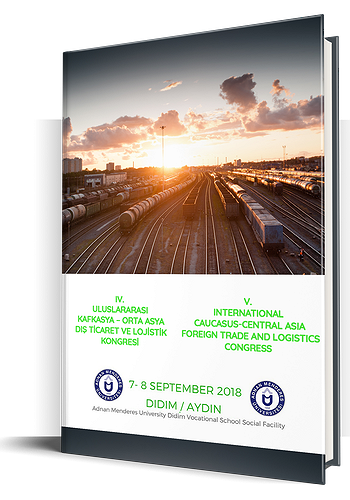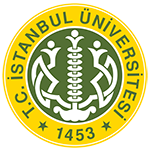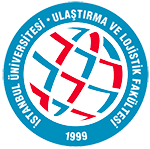
Ulaştırma ve Lojistik Kongreleri
- Türkçe
- Tam Metin
- 2018
Türkiye’de İllerin İhracatını Etkileyen Faktörlerin Mekânsal Analizi
Hayri Abar
Dr. Öğr. Üyesi, Atatürk Üniversitesi, Erzurum, Türkiye
Hasan Hüseyin Tekmanlı
Arş. Gör., Atatürk Üniversitesi, Erzurum, Türkiye
Bir ülkede üretilen mal veya hizmetin döviz karşılığında başka bir ülkeye satılması olarak tanımlanan ihracat, ithalatın tersi olarak da düşünülebilir. Dış ticaret alanındaki en önemli başlıklardan birini oluşturan ihracat, ithalatla birlikte bir ülkenin dış ticaret dengesini oluşturur. Ekonomi biliminin temel amaçlarından biri ihracat miktarını etkileyen faktörleri tespit edip ihracatı artırmaya yönelik ekonomik politikalar oluşturmaktır. Bu çalışmada 2013 yılına ait veriler kullanılarak, Türkiye’de illerin ihracatını etkileyen faktörler mekânsal ekonometrik modeller çerçevesinde incelenmiştir. İhracat miktarının bağımlı değişken olarak yer aldığı modelde sınır kapıları ve limanlar nitel, illerin ithalat ve gelişmişlik endeksi değerleri ise nicel bağımsız değişkenleri oluşturmuştur. Elde edilen Moran’s I istatistiği pozitif ve anlamlıdır. Yapılan testler sonucunda ihracat için kurulan modellerde mekânsal etkiler olduğu tespit edilmiştir. İllerin ihracatı mekânsal etkileşim içermektedir. Tahmin edilen model sonuçlarına ve elde edilen Moran’s I istatistiği değerine göre illerin ihracatının komşu illerinin ihracatından pozitif yönde etkilenmektedir. Bununla birlikte sınır kapısı ve limanı olan illerin ihracatı, olmayan illerin ihracatından daha fazladır. Ayrıca ilin gelişmişlik seviyesi ve ithalatı ile ihracatı aynı yönlü ilişkilidir. Elde edilen sonuçlara göre bölgeler için oluşturulacak cazibe merkezlerinin çevre illeri de etkileyerek ihracatı artıracağı söylenebilir.
Anahtar Kelimeler: Dış Ticaret, İhracat, Mekânsal Ekonometrik Modeller
Spatial Analysis of the Factors Affecting Exports of Province in Turkey
Exports, which are defined as the sale of goods or services produced in one country to another country in exchange for foreign currency, can also be considered as the inverse of imports. Exports, which constitute one of the most important headlines in the field of foreign trade, together with imports constitute the foreign trade balance of an country. One of the main objectives of the science of economics is to identify the factors that affect the quantity of exports and to create economic policies to increase exports. In this study, using data of 2013, factors affecting the exports of the provinces in Turkey were examined in the framework of spatial econometric models. In the model where export quantity is dependent variable, the border gates and ports are qualitative, while the import and development index values of the goods constitute quantitative independent variables. The Moran's I statistic is positive and significant. As a result of these tests, it was determined that there are spatial effects in the models established for export. Export of provinces has spatial interaction. According to the predicted model results and the obtained value of Moran's I statistic, the exports of the neighboring countries are affected positively by the export of the neighboring countries. However, export of cities that have border gate is greater than export of cities which doesn’t have a border gate. In addition, the level of development of the province and imports and exports are in the same direction. According to the results obtained, it can be said that the attraction centers to be created for the regions will increase the exports by affecting the surrounding circles
Keywords: Spatial Econometric Models, Export, Foreign Trade

IV. International Caucasus-Central Asia Foreign Trade and Logistics Congress Proceeding Book
E-ISBN: 978-605-68889-0-8
Sayfa: 565-574

Bu çalışma, kullanan kişilere orjinal çalışmadan alıntı yaptıkları sürece, çalışmayı dağıtma, değiştirme ve üzerine çalışma hakkı tanıyan Attribution 4.0 International (CC BY 4.0) lisansı ile lisanslanmıştır.
İletişim
İstanbul Üniversitesi Ulaştırma ve Lojistik Fakültesi
İ.Ü. Avcılar Kampüsü 34320 Avcılar/İstanbul
ulk@istanbul.edu.tr
+ 90 (212) 440 00 00 - 19200


